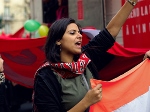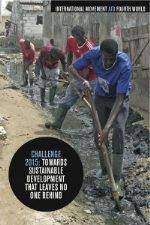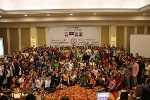Published on Thu, 2015-02-19 14:14
The social contracts of the 20th century face myriad challenges today: economic, financial and ecological crises; growing uncertainty; backlash against human rights and social justice. Civil society, grassroots organizations and social movements are calling for new social contracts, challenging the underlying power relationships and the intersections between them. At this panel discussion, key speaker Gita Sen, Valeria Esquivel from UNRISD and Roberto Bissio, Coordinator of Social Watch talk about the role of feminist movements in the remaking of social contracts. They will help untangle some of the complex power relationships that need to be addressed, if new social contracts are to fulfil the promise of human rights and gender justice. |
Published on Wed, 2015-02-18 14:19
International Movement ATD Fourth World presents the result of their participatory research on the Millennium Development Goals, Challenge 2015: Towards Sustainable Development that Leaves No One Behind, that brings the voices of people in poverty to the sustainable development debate. The result of years of participatory research with over 2,000 participants from over 20 countries, a majority of whom came from a background of poverty or extreme poverty, this report brings a unique voice to the global debate on international development. |
Published on Fri, 2015-02-13 07:55
Two hundred and fifty representatives from women leaders, young women activists, LGBT, and Civil Society Organizations, attended the national workshop on “Promoting Participation of Women in Politics” jointly organized by Committee to Promote Women in Politics and SILAKA, with a strong support from regional and international society organizations in country in order to promote women in politics. The meeting was held in Phnom Penh last January 28 2015. In her opening speech, Ms. Thida Khus, the chair of Committee to Promote Women in Politics and Executive Director of SILAKA said that “ Women Participation is very important to work effectively and promoting of increase the number of women participation in decision making in politics”. |
Published on Fri, 2015-02-13 06:35
Roberto Bissio, Coordinator of Social Watch, participated in the a side-event by the Permanent Mission of Brazil to the UN, CIDSE and Social Watch on Thursday, January 29, 2015 in the UN Conference Building, New York. Dealing with responsibilities in a financing sustainable development context, this event generated discussion on conceptual challenges such as an evenhanded approach to the three pillars of sustainable development, adapting a framework like the Financing for Development process to the universal agenda of the Sustainable Development Goals without denaturalizing and decontextualizing it and how to incorporate important principles agreed at the UN Conference on Sustainable Development. Bissio said that developed countries that have a major share in the historic responsibility of filling the atmosphere with human-generated emissions of carbon dioxide since the start of the industrial revolution, two centuries ago, are expected by the climate convention of the UN to have a greater responsibility. |
Published on Fri, 2015-02-13 05:45
In a new document entitled “Key messages on Human Rights and Financing for Development” the Office of the High Commissioner for Human Rights (OHCHR) teased out several implications of the human rights legal framework for the Financing for Development Conference. Negotiations towards the adoption of an Outcome Document for the Third International Conference on Financing for Development (FfD), to be held on 13 to 16 July in Addis Ababa, Ethiopia, are already underway. The Conference is mandated to assess progress, made in the implementation of the Monterrey Consensus and the Doha Declaration (on Financing for Development), . . . identify obstacles and constraints encountered in the achievement of the goals and objectives agreed therein, as well as actions and initiatives to overcome these constraints, and address new and emerging issues, including in the context of the recent multilateral efforts to promote international development cooperation…” |








